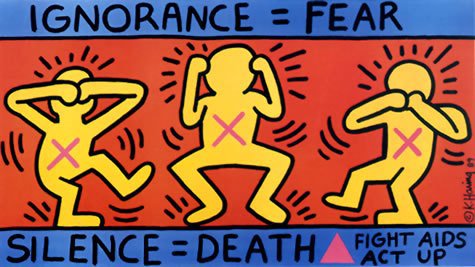Fast approaching proverbial rear view mirror status is World AIDS Day, celebrated on December 1 for “achieving the global target of halting and reversing the spread of HIV.” Pretty heady accomplishments toward a “disease with the little name” that among other things wiped out generations of people beginning in the 80s. Back then, homosexuals, Haitians, hemophiliacs and heroin drug users were referred to by the Center for Disease Control (CDC) as its top four high-risk group for AIDS/HIV. Many folks and organizations, including government workers, researchers, medical professionals and the Baltimore Afro American newspaper, dubbed this group as the “4-H Disease Alert.”
At that time, not much was known about how you got it or how you could get rid of it. There was immense stigma attached if you had it and subsequent discrimination. People didn’t want to work with you or go to school with you or treat you (dentists were notorious) or provide you with services. Consequently, people lost their jobs, children got thrown out of schools, spouses/partners lost their families, patients lost their doctors, and many connections of the heart were lost. In addition, one sure thing, if you got it you were going to die. Soon.

“Silence = Fear,” Keith Haring, 1989
My brother, David, a gay man, contracted the disease at in his 20’s. He began to look for medical solutions and began to take the first AZT regimens. He died several months later of complications associated with the virus. My friend W, now in his late 60s, said, “Here’s the really hard part for me. Between 1990 and 2000, I lost 100 friends to HIV. My entire social circle… I would have grown old with and be socializing with now are dead. I stopped counting after [the year] 2000. I stopped checking the obits because it just got too overwhelming. I lost more than 100 friends to AIDS.”
However, after all of these years, things are changing. We as a nation have received a tremendous amount of education. Most of us now know that we can only contract AIDS through direct contact with blood and bodily fluids. In the United States, AIDS is no longer perceived as an automatic death sentence. The number of HIV related deaths from HIV are way down: from 3.4 (1980) to 2.2 (2013) per 100,000 infections. This is due in large part to the development and access to antiretroviral medicines. I have friends and colleagues who have been living with the virus and thriving for more than 30 years.
So while we have made progress and the stigma of being diagnosed with HIV/AIDS has effectively been lessened in the US (Charlie Sheen came out and shared his positive diagnosis with us); we are finding that diverse elders are disproportionately affected by HIV, creating unique challenges including ageist misconceptions, aging, stigma and shame. The CDC states that in 2013, people aged 50 and over accounted for 21% (8,575) of an estimated 47,352 HIV diagnoses in the United States. Of these, the largest number (44%, 3,747) were among those aged 50 to 54. In 2013, among persons aged 50 to 54, the estimated rate (per 100,000) of HIV diagnoses by race/ethnicity was 59.3 among African Americans/blacks, 23.3 among Hispanics/Latinos, and 8.7 among whites. In 2013, people aged 50 and older accounted for 27% (7,108) of the estimated 26,688 AIDS diagnoses in the United States. Of the 6,955 deaths related to AIDS in 2013, 2,588 (37%) were among people aged 55 and older.
Can we have WORLD AIDS YEAR? Yes, let’s remember those we have loved and lost. Yes, let’s marvel about the good we have done and the research we’ve conducted. Yes Let’s! But by all means, let’s also continue to move forward and work with the organizations who are pushing the envelope to advocate and help the people, like Us Helping Us – one of the first organizations in the nation created to help Black men cope with HIV or the National Black Justice Coalition (NBJC), the nation’s leading civil rights organization dedicated to the empowerment of Black lesbian, gay, bisexual and transgender (LGBT) people, through its Black LGBT Health & Wellness Initiative or Services and Advocacy for Gay, Lesbian, Bisexual and Transgender Elders (SAGE) that advocates on a Federal level and works with national organizations including the Diverse Elders Coalition’s Wellness HIV Initiative.
Let’s change the laws, let bring down the costs of medicines, let’s find a cure.
And yes, we’ve come a long way.
The opinions expressed in this article are those of the author and do not necessarily reflect those of the Diverse Elders Coalition.

